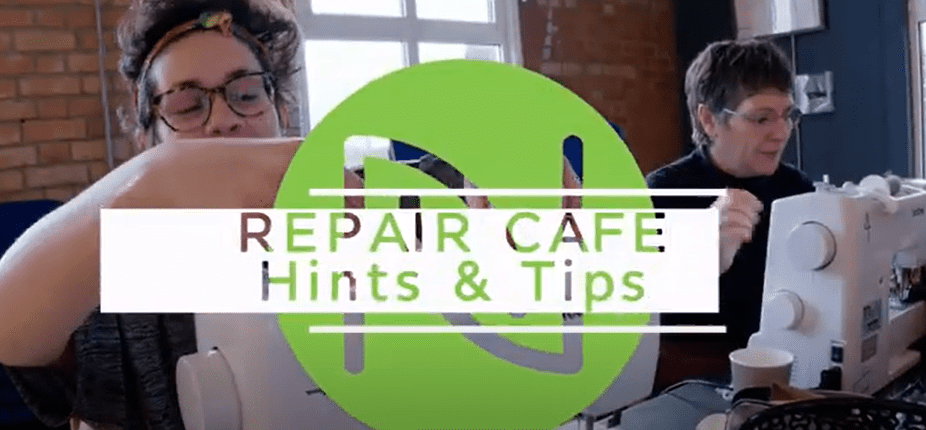Repair cafés play a significant role in driving the transition to a more circular economy. As pop-up community events, repair cafés afford the public the opportunity to bring something broken to a group of volunteers who can mend their item free of charge. However, repair cafés are about much more than fixing broken things. Repair cafés create a space for relationship building, skills development and community cohesion, therefore representing a sea change in the reuse and repair sector. In the newly launched ‘Hints and Tips’ video, NIRN has captured some of the voices leading this movement in Northern Ireland, giving you a flavour of what it takes to get a repair café up and running.
The video outlines six considerations when it comes to setting up a repair café. First, experience a repair café for yourself! Having celebrated its 5th birthday, Belfast Repair Café is the oldest repair café in Northern Ireland, and multiple repair cafés have grown out of what was originally a pilot initiative. Find one near you and drop by to experience the magic of a repair café first-hand.
Secondly, it is important to consider where to host a repair café. Do you have a secure and safe place in mind? It could be a static location or your repair café could move around, like Repair Café Foyle. As Eimear Montague, Director of NIRN, makes clear, “there is no one model in relation to a repair café”.
Thirdly, it’s time to think about recruiting ‘fixers’ – the people with the expertise and knowledge to mend broken items. While you may think that this third stage represents the greatest stumbling block, in reality, fixers are not hard to come by. Repair is intuitive for some, and in a disposable society which can overlook important skill sets, like reuse and repair, many people love the opportunity to put their specialist skills to good use. Local people freely give their time in repair cafés across Northern Ireland to fix broken items, with some also running classes in upcycling to educate and upskill people who drop by. The relationship between the fixer and the person with a broken item is also based on reciprocity and mutual respect, the person with the broken item is encouraged to sit with their fixer while the item is mended, so they can learn more about how to repair or maintain it in the future.
The fourth stage, which is closely related to the former consideration, is volunteer recruitment. As Caroline McGuinness-Brooks from NIRN observes, ‘it takes all types of people to run a repair café’. Caroline is actively involved in Repair Café Foyle, and she explains that you need more than fixers, makers and menders. You need people who can organise the venue, arrange the logistics, take care of the admin, make tea and coffee, bake, and make people feel welcome. Whatever skill you have, it will be relevant to the operation of a repair café in some way.
The fifth question which then emerges is ‘how do we get people through the door?’ As Caroline suggests, ‘People are intrigued by a repair café’, Caroline remarks. The video shows the high levels of interest from people coming through the door who bring a diverse range of items to get fixed: air fryers, dolls, vacuum cleaners, furniture. Some of the items have passed through 3 generations, and some items have travelled more countries and lived longer than their owner. Each item has a story, and this adds to the excitement about getting something repaired, as Catherine Taylor from Be Safe Be Well Men’s Shed remarks.
Finally, the sixth stage is taking care of all the ‘practical stuff’. While things like insurance cover, risk assessments and health and safety may seem intimidating to some readers, the beauty of NIRN is that the network can put you in contact with other repair cafés who have gone through the same process, and can support you with these steps. With other members already operating different repair cafés across Northern Ireland, NIRN connects established organisations with pilot projects, helping first time repair cafés understand what they need to do.
Ultimately, it is the social and environmental co-benefits of repair cafés which make them so successful in terms of impact and reach. Repair cafés not only drive climate action, but they also ensure solutions exchange and knowledge sharing, affording groups and communities the opportunity to work together as a collective and explore projects. NIRN is committed to integrating the voices of repair and reuse into the heart of our work: volunteers, fixers, menders and makers are the environmental stewards of our present and future.
